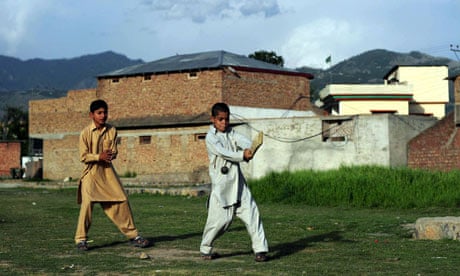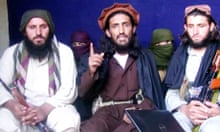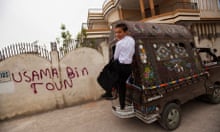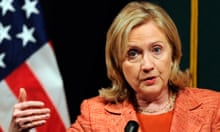Pakistani intelligence has detained five alleged CIA informants who spied on Osama bin Laden in the months before the al-Qaida chief was killed in a special forces raid, US and Pakistani officials have said.
The Pakistani informants noted the details of vehicles visiting Bin Laden's house in Abbottabad, 35 miles north of Islamabad, and helped run a nearby house from which CIA spies watched the al-Qaida leader.
A Pakistani official said the owner of the CIA hideout had been arrested along with several other people.
A military spokesman denied a New York Times report that a serving army major had also been detained. The arrests highlight continuing tensions between the US and Pakistan in the wake of Bin Laden's death. They are likely to intensify pressure from senior Washington politicians to cut Pakistan's $2bn annual aid package.
Last week the CIA chief, Leon Panetta, visited Islamabad to meet the Pakistani army chief, General Ashfaq Kayani, and the head of the Inter-Services Intelligence agency (ISI), General Shuja Pasha. Pakistani officials said Panetta was issued with stern warnings about CIA activities in Pakistan.
US media said Panetta had confronted the Pakistanis with video footage that showed militants fleeing a bomb factory in Waziristan shortly after the CIA had informed the Pakistani military of its location.
The CIA hideout in Abbottabad was set up some time after last August, when the CIA began to suspect Bin Laden could be hiding in the area, less than a mile from a major Pakistani military facility.
Watching from behind mirrored glass, CIA officials used telephoto lenses and infra-red imaging equipment to establish a "pattern of life" inside the compound and eavesdropped on voices inside. But they never conclusively identified Bin Laden.
A Pakistani official said the Americans hired locals because "the presence of white caucasians in Abbottabad would obviously have drawn attention". Since being arrested men have claimed they did not know they were working for the CIA.
"Some are saying they didn't know they were working for a foreign organisation. They said they were approached by a Pakistani, reported to a Pakistani and they weren't spying on Pakistan – they were spying on terrorists," he said.
One of those detained was believed to be a medic with the army medical corps, the official said. But the army spokesman said that was not true.
The arrests may bring fresh attention to a house 200 feet behind Bin Laden's back wall, on the far side of a field. Neighbours say it is owned by a serving army major.
The nameplate, which read Major Amir Aziz, was removed within days of the raid. The occupants of the house refused to answer the door.
A US official said only one of the arrested men was "related" to the US government and he was not a military official.
Pakistani officials insist they are within their rights to crack down on soldiers or civilians involved in foreign espionage. "No country would allow its officials or people to spy for another country," said one.
But American anger is fuelled by Pakistan's failure to locate any of the people who helped protect Bin Laden in Abbottabad for up to six years.
In a closed briefing last week senior congressmen asked the CIA deputy director, Michael Morell, to rate Pakistan's counter-terrorism cooperation on a scale of one to 10. "Three," replied Morell according to the New York Times.
Positions are hardening in Pakistan too. The military has shut down a US military training programme for the Frontier Corps paramilitary force, which leads the fight against the Pakistani Taliban in the tribal belt.
Last week the army leadership disputed US claims of $15bn in aid over the past decade. The true figure was $1.4bn with another $6.2bn going to the civilian government, a statement said.
The ISI is trying to expose undeclared CIA agents by scrutinising visas issued to suspicious foreigners. A US citizen living in Islamabad and married to a Pakistani has been arrested and charged with "anti-state activities".
Senior US officials have warned their Pakistani counterparts that if US personnel are barred from Pakistan, the CIA will find other ways of conducting espionage including drawing on the large Pakistani-American Muslim diaspora.
The CIA's biggest worry, though, is that Pakistan will restrict drone strikes against militant targets in the tribal belt. These attacks have continued unhindered since Bin Laden's death.
Some drones take off from an airstrip in western Balochistan province but are being moved to Afghanistan as a contingency measure.
A senior Pakistani official said the dispute represented a clash between "Pakistani hyper-nationalism and American arrogance".
"The lesson we should have learned from the OBL raid is that America has the power to circumvent us. Instead we've gone into chest-thumping nationalist mode, and that's not helping," he said.



